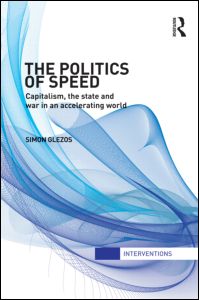Simon Glezos holds a Ph.D. in political theory and international relations from the Johns Hopkins University in Baltimore (2008), and a BA in political science - with a minor in philosophy - from the University of Victoria (2002). Before starting his position as an assistant professor in the department of political science, he taught at the University of Regina and held a post-doctoral research fellowship at the Pacific Centre for Technology and Culture.
Simon Glezos' primary focus as a political theorist is on continental thinkers of the 19th and 20th century, including Gilles Deleuze and Felix Guattari, Michel Foucault, Paul Virilio, Antonio Negri, Maurice Merleau-Ponty, Joseph Schumpeter, Henri Bergson, Friedrich Nietzsche, Karl Marx, and Immanuel Kant. He also works with theorists from the earlier history of political thought, especially Niccolo Machiavelli and Baruch Spinoza, but also John Locke, Thomas Hobbes and John Stuart Mill. Given this theoretical archive, his work engages with many strands in contemporary political theory, including new materialisms, post-structuralism, phenomenology, radical democratic traditions, and contemporary marxist and anarchist theories. In addition, Simon is very interested in post-colonial approaches to political thought, and has increasingly been engaging with comparative and non-western political theories and philosophies.
Although primarily a political theorist, Simon has also taught extensively in IR. Global politics, IR theory and global political theory have always been central to his teaching and research agenda. Of particular interest to him has been the question of speed and technological acceleration, and its impact on contemporary global politics. In his first book, The Politics of Speed: Capitalism, the State and War in an Accelerating World(Routledge, 2012) Simon sought to develop a nuanced theoretical conception of the ontological nature of speed, and trace out the effects of technological acceleration on global, domestic and local politics. This included discussions of the ways in which the acceleration of global life was affecting practices of democracy, warfare, capitalism and technological innovation, globalization and international migration, and transnational activism. Central to this project was an attempt to understand how we might engage with the acceleration of global flows in a way which encourages practices of democratic engagement, economic egalitarianism, and an ethos of pluralism,
His current research project carries forward this engagement with the question of speed, but shifts the emphasis from the macropolitical - large scale aggregates like the state, capitalism and warfare - to a focus on the micropolitical - asking how the acceleration of global flows affects individual bodies, minds, perceptions, subjectivities and movements. In this new book, therefore, he concentrates on issues such as global migration, accelerating information and communication technologies, digital media, social networks and social movements. The book also seeks to mine the history of political thought for insights into how to ethically engage with an accelerating world. It does this by discussing thinkers who were writing in their own periods of social acceleration (Machiavelli during the renaissance, Spinoza during the Dutch trading empire, Nietzsche at the height of the industrial revolution) and putting them into conversation with contemporary political theorists such as Wendy Brown, N. Katherine Hayles, Catherine Malabou, William E. Connolly, Jane Bennett and Judith Butler.



